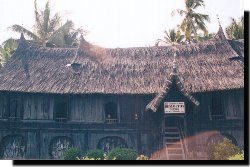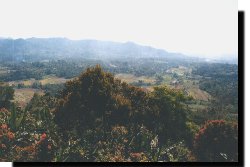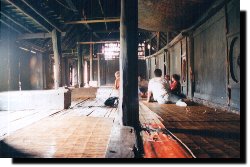|
Minangkabau turned out to be much more than we thought. It was a haven
secluded from the western land: A small pocket of flat land surrounded by
tall mountains and rolling hills. Rice fields and cinnamon trees
encompassed the hills, and the sunny reflections were brilliant off of the
still waters covering the fields. The land was rich with green all over,
and if anything (everything), this matrilineal land was where women actually
ruled.
 This land was not a woman's Harlem, but a land where lineage was determined
by the mother. In hindsight, it makes more sense, as family is identified
via the mother. This way, the child is sure to be the "mother's" child, and
avoids any questions versus the father. The mother assumes responsibility
of the "identity" and name of the child. This way, the child is protected
against any fatherly "mishaps," and every child born to the mother (and the
matrilineal family) assumes right to heir -- Pretty clever if you ask me...
This land was not a woman's Harlem, but a land where lineage was determined
by the mother. In hindsight, it makes more sense, as family is identified
via the mother. This way, the child is sure to be the "mother's" child, and
avoids any questions versus the father. The mother assumes responsibility
of the "identity" and name of the child. This way, the child is protected
against any fatherly "mishaps," and every child born to the mother (and the
matrilineal family) assumes right to heir -- Pretty clever if you ask me...
 Which poses great difficulty to the man. The man becomes a mere utility to
production of children, and all working efforts get siphoned to the mother
and child. Not that anything's really different (really), but the father's
"name" -- so to speak -- disappears with his death, and only his noble works
echo through the tests of time. I suppose this simply turns the table
versus the modern woman, and this hatches more questions than answers, but
this simple pondering left our companions -- Natalie, Keith, and of course,
Aaron -- in wonders.
Which poses great difficulty to the man. The man becomes a mere utility to
production of children, and all working efforts get siphoned to the mother
and child. Not that anything's really different (really), but the father's
"name" -- so to speak -- disappears with his death, and only his noble works
echo through the tests of time. I suppose this simply turns the table
versus the modern woman, and this hatches more questions than answers, but
this simple pondering left our companions -- Natalie, Keith, and of course,
Aaron -- in wonders.
 Of course, it's always a curiosity to decipher the appropriate manner to
institute this thing called "marriage" or "relationships,"but for a modern
man, this little slant offers curious avenues to re-evaluate what currently
exists.
Of course, it's always a curiosity to decipher the appropriate manner to
institute this thing called "marriage" or "relationships,"but for a modern
man, this little slant offers curious avenues to re-evaluate what currently
exists.
|